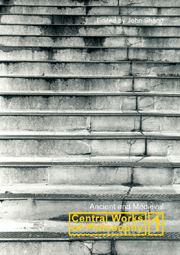Book contents
- Frontmatter
- Contents
- Contributors
- Preface
- Ancient and Medieval Philosophy: Introduction
- 1 Plato: Republic
- 2 Aristotle: Nicomachean Ethics
- 3 Lucretius: On the Nature of the Universe
- 4 Sextus Empiricus: Outlines of Pyrrhonism
- 5 Plotinus: The Enneads
- 6 Augustine: City of God
- 7 Anselm: Proslogion
- 8 Aquinas: Summa Theologiae
- 9 Duns Scotus: Ordinatio
- 10 William of Ockham: Summa Logicae
- Index
3 - Lucretius: On the Nature of the Universe
- Frontmatter
- Contents
- Contributors
- Preface
- Ancient and Medieval Philosophy: Introduction
- 1 Plato: Republic
- 2 Aristotle: Nicomachean Ethics
- 3 Lucretius: On the Nature of the Universe
- 4 Sextus Empiricus: Outlines of Pyrrhonism
- 5 Plotinus: The Enneads
- 6 Augustine: City of God
- 7 Anselm: Proslogion
- 8 Aquinas: Summa Theologiae
- 9 Duns Scotus: Ordinatio
- 10 William of Ockham: Summa Logicae
- Index
Summary
Introduction: Lucretius's method
Titus Lucretius Carus, to give him his full name, lived probably from 99 to 55 BCE. Virtually nothing is known of his life, or why he died young; there is no reason to believe the story that he was driven mad by a love potion and committed suicide. He was probably of aristocratic birth, married, and a fairly prosperous farmer, prosperous enough not to have to work on the farm with his own hands, but not so prosperous that he could employ a bailiff. There are references in his poem to the management of the farm keeping him very busy, so that he could find time for writing only at night. His work consists of one long philosophical poem, De rerum natura, literally, “On the Nature of Things”, but often translated, more philosophically, as “On the Nature of the Universe”, unfinished at his death but already in six books and over 7000 lines. This poem is the most complete account we have of the philosophy of Epicurus (341–271 BCE), because all that survives of the works of Epicurus himself are three letters, two collections of aphorisms and an account of his “Principal Doctrines”, plus fragments and later reports of what he wrote.
These writings provide evidence that Lucretius largely stayed very close to Epicurus, and often simply put his doctrines and arguments into poetry.
- Type
- Chapter
- Information
- Central Works of Philosophy , pp. 69 - 89Publisher: Acumen PublishingPrint publication year: 2005



